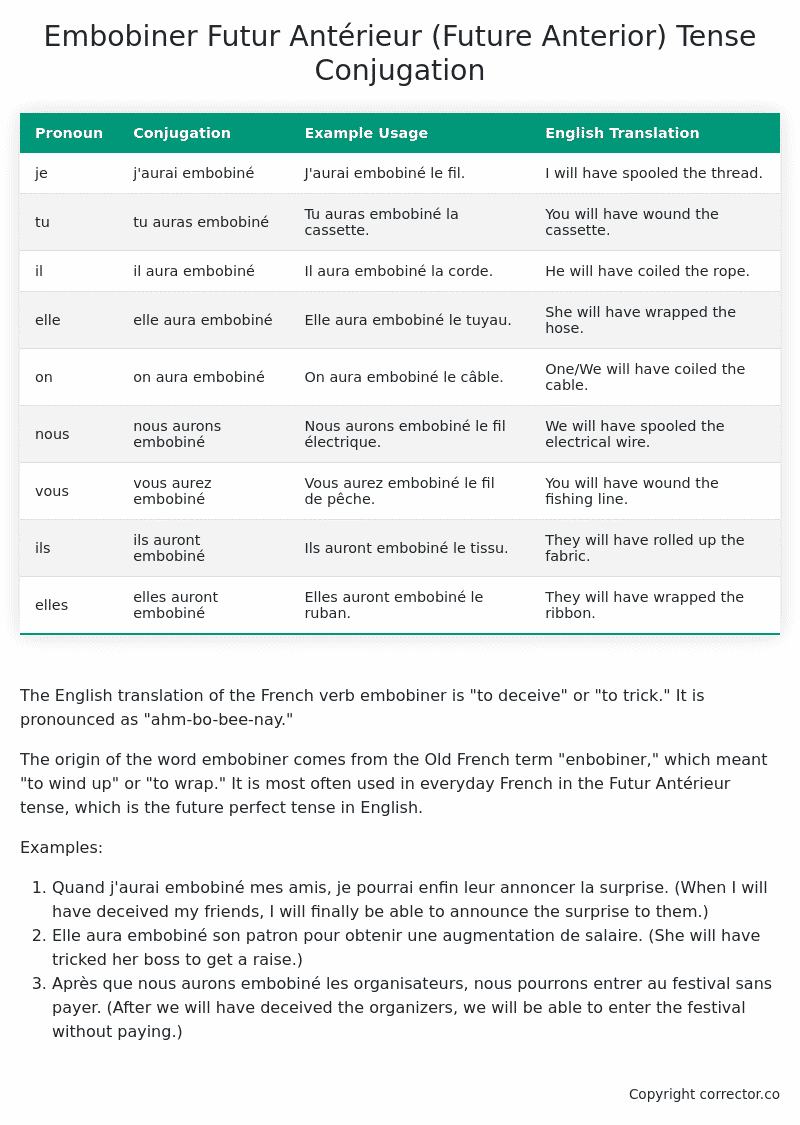Futur Antérieur (Future Anterior) Tense Conjugation of the French Verb embobiner
Introduction to the verb embobiner
The English translation of the French verb embobiner is “to deceive” or “to trick.” It is pronounced as “ahm-bo-bee-nay.”
The origin of the word embobiner comes from the Old French term “enbobiner,” which meant “to wind up” or “to wrap.” It is most often used in everyday French in the Futur Antérieur tense, which is the future perfect tense in English.
Examples:
- Quand j’aurai embobiné mes amis, je pourrai enfin leur annoncer la surprise. (When I will have deceived my friends, I will finally be able to announce the surprise to them.)
- Elle aura embobiné son patron pour obtenir une augmentation de salaire. (She will have tricked her boss to get a raise.)
- Après que nous aurons embobiné les organisateurs, nous pourrons entrer au festival sans payer. (After we will have deceived the organizers, we will be able to enter the festival without paying.)
Table of the Futur Antérieur (Future Anterior) Tense Conjugation of embobiner
| Pronoun | Conjugation | Example Usage | English Translation |
|---|---|---|---|
| je | j’aurai embobiné | J’aurai embobiné le fil. | I will have spooled the thread. |
| tu | tu auras embobiné | Tu auras embobiné la cassette. | You will have wound the cassette. |
| il | il aura embobiné | Il aura embobiné la corde. | He will have coiled the rope. |
| elle | elle aura embobiné | Elle aura embobiné le tuyau. | She will have wrapped the hose. |
| on | on aura embobiné | On aura embobiné le câble. | One/We will have coiled the cable. |
| nous | nous aurons embobiné | Nous aurons embobiné le fil électrique. | We will have spooled the electrical wire. |
| vous | vous aurez embobiné | Vous aurez embobiné le fil de pêche. | You will have wound the fishing line. |
| ils | ils auront embobiné | Ils auront embobiné le tissu. | They will have rolled up the fabric. |
| elles | elles auront embobiné | Elles auront embobiné le ruban. | They will have wrapped the ribbon. |
Other Conjugations for Embobiner.
Le Present (Present Tense) Conjugation of the French Verb embobiner
Imparfait (Imperfect) Tense Conjugation of the French Verb embobiner
Passé Simple (Simple Past) Tense Conjugation of the French Verb embobiner
Passé Composé (Present Perfect) Tense Conjugation of the French Verb embobiner
Futur Simple (Simple Future) Tense Conjugation of the French Verb embobiner
Futur Proche (Near Future) Tense Conjugation of the French Verb embobiner
Plus-que-parfait (Pluperfect) Tense Conjugation of the French Verb embobiner
Passé Antérieur (Past Anterior) Tense Conjugation of the French Verb embobiner
Futur Antérieur (Future Anterior) Tense Conjugation of the French Verb embobiner (this article)
Subjonctif Présent (Subjunctive Present) Tense Conjugation of the French Verb embobiner
Subjonctif Passé (Subjunctive Past) Tense Conjugation of the French Verb embobiner
Subjonctif Imparfait (Subjunctive Imperfect) Tense Conjugation of the French Verb embobiner
Subjonctif Plus-que-parfait (Subjunctive Pluperfect) Tense Conjugation of the French Verb embobiner
Conditionnel Présent (Conditional Present) Tense Conjugation of the French Verb embobiner
Conditionnel Passé (Conditional Past) Tense Conjugation of the French Verb embobiner
L’impératif Présent (Imperative Present) Tense Conjugation of the French Verb embobiner
L’infinitif Présent (Infinitive Present) Tense Conjugation of the French Verb embobiner
Struggling with French verbs or the language in general? Why not use our free French Grammar Checker – no registration required!
Get a FREE Download Study Sheet of this Conjugation 🔥
Simply right click the image below, click “save image” and get your free reference for the embobiner Futur Antérieur tense conjugation!

Embobiner – About the French Futur Antérieur (Future Anterior) Tense
Construction
Common Everyday Usage Patterns
Interactions with Other Tenses
For example
Summary
I hope you enjoyed this article on the verb embobiner. Still in a learning mood? Check out another TOTALLY random French verb conjugation!


